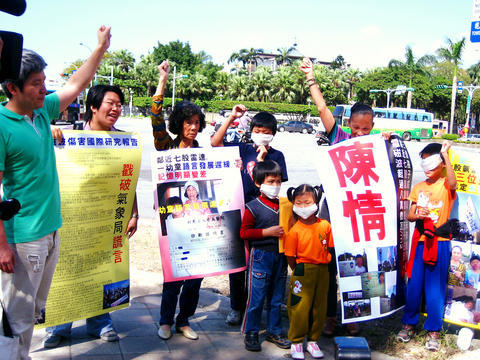Representatives of the Taiwan Environmental Protection Union (TEPU) yesterday took an appeal to the Presidential Office, alleging a weather radar in Chiku Township (七股), Tainan County, was causing a high rate of mental retardation and other illnesses in the area.
Accompanied by alleged victims of the electromagnetic waves emitted by the Doppler weather radar station in Yencheng Village (
The Doppler radar station was built in 2001 and is one of four such stations in the country. The bureau's Weather Integration and Nowcasting System (WINS) employs Doppler radar both to monitor and predict precipitation.

PHOTO: MEGGIE LU, TAIPEI TIMES
A woman surnamed Chang (張), whose six-year-old granddaughter was diagnosed with severe mental retardation (MR) this month, attended the appeal. Chang's granddaughter is the third in the family to be diagnosed with MR after Chang's two youngest sons received the same diagnosis, Chen said.
Chen said that medical tests had revealed no genetic predisposition in the family for MR, while lead poisoning and radioactive contamination in the area had also been ruled out.
Chen said that, in addition to MR cases, the village had also seen an increase in the incidence of hearing loss, brain damage and cancer since the installment of the radar station.
She cited 12 articles by international scientists to support her claim that radioactivity in residential areas is harmful to human health.
Chen said National Taiwan University and the Industrial Technology Research Institute had measured the electromagnetic waves in the village at 4,027 and 84,200 microwatts per square meter respectively. A report by US scientist S. Amy Sage last month suggested that levels above 1,000 microwatts per square meter be avoided for health reasons.
After meeting a Presidential Office representative, Chen said the the staffer had promised to relay the group's appeal to the president.
In addition to the appeal, Chiku residents demonstrated yesterday against the radar's presence in their community.
The weather bureau said in a press release later yesterday that the research TEPU had cited concerned low-frequency electromagnetic waves, microwaves and handheld radar, adding that Doppler waves are different.
In addition, the radar is perched 30m above the ground, it said, adding that since the installment of the station in 2001, the bureau has employed independent agencies to test electromagnetic levels on five occasions.
The most recent electromagnetic test, conducted by the Environmental Protection Agency (EPA), was completed last week, the statement said, adding that electromagnetic waves were measured at 25,200 microwatts per square meter directly around the radar and 10,200 microwatts per square meter near the closest residency. The release said this was 0.1 percent to 0.25 percent of the EPA's safety limit.

Chinese spouse and influencer Guan Guan’s (關關) residency permit has been revoked for repeatedly posting pro-China videos that threaten national security, the National Immigration Agency confirmed today. Guan Guan has said many controversial statements in her videos posted to Douyin (抖音), including “the red flag will soon be painted all over Taiwan” and “Taiwan is an inseparable part of China,” and expressing hope for expedited reunification. The agency last year received multiple reports alleging that Guan Guan had advocated for armed reunification. After verifying the reports, the agency last month issued a notice requiring her to appear and explain her actions. Guan

GIVE AND TAKE: Blood demand continues to rise each year, while fewer young donors are available due to the nation’s falling birthrate, a doctor said Blood donors can redeem points earned from donations to obtain limited edition Formosan black bear travel mugs, the Kaohsiung Blood Center said yesterday, as it announced a goal of stocking 20,000 units of blood prior to the Lunar New Year. The last month of the lunar year is National Blood Donation Month, when local centers seek to stockpile blood for use during the Lunar New Year holiday. The blood demand in southern Taiwan — including Tainan and Kaohsiung, as well as Chiayi, Pingtung, Penghu and Taitung counties — is about 2,000 units per day, the center said. The donation campaign aims to boost

The Kaohsiung Tourism Bureau audited six hotels in an effort to prevent price gouging ahead of Korean band BTS’ concert tour in the city scheduled for Nov. 19, 21 and 22 this year. The bureau on Friday said that the audits — conducted in response to allegations of unfair pricing posted on social media — found no wrongdoing. These establishments included the local branches of Chateau de Chine, Hotel Nikko, My Humble House, and Grand Hai Lai, it said, adding that the Consumer Protection Commission would have penalized price gougers had the accusations been substantiated. The bureau said the Tourism Development Act

The Central Weather Administration (CWA) said a magnitude 4.9 earthquake that struck off the coast of eastern Taiwan yesterday was an independent event and part of a stress-adjustment process. The earthquake occurred at 4:47pm, with its epicenter at sea about 45.4km south of Yilan County Hall at a depth of 5.9km, the CWA said. The quake's intensity, which gauges the actual effects of a temblor, was highest in several townships in Yilan and neighboring Hualien County, where it measured 4 on Taiwan's seven-tier intensity scale, the CWA said. Lin Po-yu (林柏佑), a division chief at the CWA's Seismological Center, told a news conference